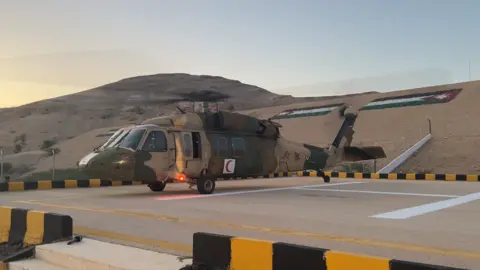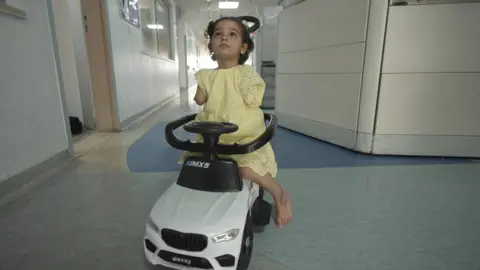BBC joins Gaza children as they are evacuated to Jordan for treatment
7 minutes agoFergal KeaneSpecial correspondent
We were flying through the warm light of the setting sun. There were villages and small towns where the lights were coming on. It was a peaceful landscape where people walked and drove without constantly looking to the sky.
We were over the suburbs of Amman when Safa’a Salha held up her mobile phone so that I could read a message she’d written.
“Oh my God,” this Gaza mother wrote, “Jordan is so beautiful.”
The evacuees had come to the Jordanian border by road. I joined them there for the final part of the journey by helicopter to Amman.
Safa’a spoke very little English, and in any case the noise of the helicopter made it impossible to converse.
She showed me another message. “We used to see this [helicopter] every day and it was coming to bomb and kill. But today the feeling is totally different.”
Next to her sat her 16-year-old son Youssef who showed me the scar on his head from his last surgery. He smiled and wanted to speak, not of Gaza but ordinary things. How he was excited by the helicopter, how he liked football. Youssef said he was very happy and gave me a fist bump.
Beside him was nine-year-old Sama Awad, frail and scared-looking, holding the hand of her mother, Isra. Sama has a brain tumour and will have surgery in Amman.
“I hope she can get the best treatment here,” said Isra, when we were on the ground and the noise of the engines faded.
I asked a question which had been answered for me many times by looking at images, but not face to face by someone who had just left.
What is Gaza like now?
“It is horrible. It is impossible to describe. Horrible on so many levels. But people are just trying to get on with living,” Isra replied.


Four sick children were evacuated to Jordan along with twelve parents and guardians. They left Gaza by ambulance on Wednesday morning and travelled through Israel without stopping until they reached the border crossing.
The plan to evacuate children was first unveiled during a meeting between US President Donald Trump and Jordan’s King Hussein in February.
Jordan’s stated aim is to bring 2,000 sick children to the kingdom for treatment. So far only 33 have been evacuated to Jordan, each travelling with a parent or guardian.
Jordanian sources say Israel has delayed and imposed restrictions and this – along with the resumption of the war – has impeded the evacuation process. Sick Gazans have also been evacuated to other countries via Israel.
We put the Jordanian concerns to the Israeli government organisation responsible – Cogat (Coordinator of Government Activities in the Territories) – who told us that since “the beginning of the year, and especially in recent weeks, there has been a significant increase in the number of Gazans evacuated through Israel for medical care abroad.”
Cogat said thousands of patients and escorts had gone to countries, including Jordan, the United Arab Emirates, the US and others. The statement said that “the ongoing hostilities in the Gaza Strip pose a challenge to the implementation of these evacuation operations.”
Israel broke the last ceasefire in March launching a wave of attacks on what it said were Hamas positions.
Gaza remains a claustrophobic zone of hunger and death for its residents. Those who get out for medical treatment are the exception.
According to the UN the population of 2.1 million is facing the risk of famine. The organisation’s head of humanitarian affairs, Tom Fletcher, has appealed to the UN Security Council to act to “prevent genocide” in Gaza.
These are strong words for a man trained in the sober traditions of the British Foreign Office and who has served as an ambassador and senior government advisor.
The Israeli blockade is preventing essential aid supplies from reaching the population. That along with the continued bombing explain Isra Abu Jame’s description of a place horrible beyond words.
The children who arrived in Jordan on Wednesday from Gaza will join a small community of other wounded and sick youngsters in different Amman hospitals.
Since January we have been following the case of Habiba Al-Askari, who came with her mother Rana in the hope doctors might be able to save three gangrene infected limbs – two arms, and a leg.
But the infection – caused by a rare skin condition – had gone too far. Habiba underwent a triple amputation.


When I met Habiba and Rana again this week, the little girl was using the toes of her remaining foot to scroll, and play children’s games on her mum’s phone. She blew kisses with the stump of her arm. This was a very different child to the frightened girl I met on the helicopter evacuation five months ago.
“She’s a strong person,” Rana said. Habiba will be fitted with prosthetic limbs. Already she is determined to walk, asking her mother to hold under her armpits while she hops.
Some day, Rana hopes, she will take Habiba back to Gaza. Mother and child are safe and well cared for in Amman, but their entire world, their family and neighbours are back in the ruins. Concerns about Habiba’s health make Rana reluctant to contemplate going back soon.
“We have no house. If we want go back where will we go? We would be going back to a tent full of sand…[but] I truly want to return. Gaza is beautiful, despite everything that has happened. To me Gaza will always be the most precious spot on this entire earth.”
They will return. But to war or peace? Nobody knows.
With additional reporting by Alice Doyard, Suha Kawar, Nik Millard and Malaak Khassouneh.